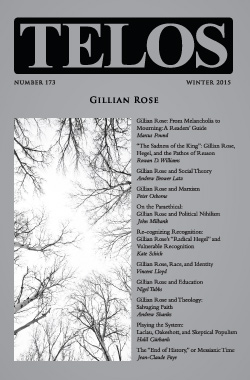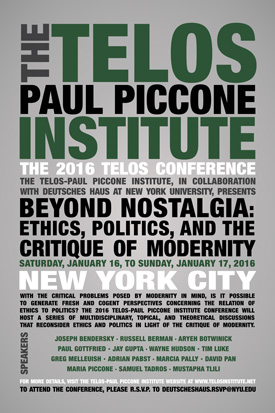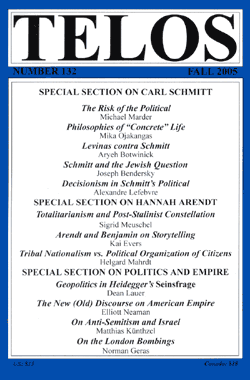By Kenneth D. Johnson · Monday, February 8, 2016 Kenneth D. Johnson is affiliated with the William J. Seymour Institute for Black Church and Policy Studies, in Boston. The following paper was presented at the 2016 Telos Conference, held on January 16–17, 2016, in New York City. For news about upcoming conferences and events, please visit the Telos-Paul Piccone Institute website.
Introduction
The spate of killings of unarmed African American males by police and vigilante residents has continued to roil public opinion in the black community, leading to various forms of social protest, in particular by varied groups of young adult African Americans.
Preeminent among these groups is #BlackLivesMatter, which now aspires to become a national movement, sometimes in coalition with other contemporary groups formed near the same time, and displacing older Civil Rights groups and the Black Church’s ethical and protest traditions.
While #BlackLivesMatter has partly instrumentalized Black Church social protest tradition, it has done so in the service of a fundamentally secular set of ethical commitments. In the process, the #BlackLivesMatter movement has discarded the internal resources of self-critique that Black Church ethical praxis provides.
Continue reading →
By Nigel Tubbs · Thursday, February 4, 2016  In her preface to the 1995 edition of Hegel Contra Sociology, Gillian Rose says that her project is “to demonstrate a nonfoundational and radical Hegel, which overcomes the opposit[ion] between nihilism and rationalism” and can renew critical thought “in the intellectual difficulty of our time.” However, I think this is not quite the case, for two reasons. First, Rose’s Hegel is not nonfoundational. Instead, as the book makes very clear, Rose’s Hegel does think the absolute, or the true. Yet her Hegel is also radical because she does not eschew the “ineluctable difficulty” of the authority of saying that truth either can or cannot be thought. Second, and in the teeth of this apparent inconsistency, thinking the absolute does not “overcome” such oppositions. Instead, it learns of their truth, their self-determination, by rethinking the religious and political presuppositions upon which these oppositions depend. Against the logic of mastery and ownership, or the propertied logic, that continues to dominate Western thinking, in Rose’s Hegel the learning and education which is endemic to the Aufhebung is not prejudged as “overcoming” (i.e., as abstract truth) or “failing to overcome” (yielding chaos and infinite regression). Instead, what it commends, and what I explore in this article, is a different logic of freedom, an educational logic, which can find its truth in preserving and reforming the opposition between nihilism and rationalism. This self-determining educational logic is the work in which thinking can renew itself in the intellectual difficulty of our time. In her preface to the 1995 edition of Hegel Contra Sociology, Gillian Rose says that her project is “to demonstrate a nonfoundational and radical Hegel, which overcomes the opposit[ion] between nihilism and rationalism” and can renew critical thought “in the intellectual difficulty of our time.” However, I think this is not quite the case, for two reasons. First, Rose’s Hegel is not nonfoundational. Instead, as the book makes very clear, Rose’s Hegel does think the absolute, or the true. Yet her Hegel is also radical because she does not eschew the “ineluctable difficulty” of the authority of saying that truth either can or cannot be thought. Second, and in the teeth of this apparent inconsistency, thinking the absolute does not “overcome” such oppositions. Instead, it learns of their truth, their self-determination, by rethinking the religious and political presuppositions upon which these oppositions depend. Against the logic of mastery and ownership, or the propertied logic, that continues to dominate Western thinking, in Rose’s Hegel the learning and education which is endemic to the Aufhebung is not prejudged as “overcoming” (i.e., as abstract truth) or “failing to overcome” (yielding chaos and infinite regression). Instead, what it commends, and what I explore in this article, is a different logic of freedom, an educational logic, which can find its truth in preserving and reforming the opposition between nihilism and rationalism. This self-determining educational logic is the work in which thinking can renew itself in the intellectual difficulty of our time.
Continue reading →
By Andrew Shanks · Tuesday, February 2, 2016  Gillian Rose began as a sympathetic interpreter of Adorno. This essay considers the abiding strength of Adorno’s thought, from her point of view, by contrast for instance with that of Heidegger; but also the rationale of her eventual move beyond Adorno, and back to Hegel. Fundamentally at issue, in this move, is the Hegelian notion of “Absolute Knowing,” as a systematic re-opening of the most purely rationalistic philosophy, toward theology. That is, the sense in which it represents an ideal “salvage” strategy, with regard to religion: neither over-reductionist in the manner of Kant, or of Feuerbach, nor inadequately critical in the manner of Schleiermacher; but, rather, an approach precisely focused on the ineradicable ambiguity of all religious utterance—as a potential medium for “Spirit”—even whilst fully acknowledging religion’s unsurpassable potential virtues as a non-elitist mode of communication. Rose, it is argued, quite rightly sees beyond Adorno’s caricatural misreading of Hegelian grand-narrative “theodicy”: which is by no means, in fact, the intrinsically de-sensitizing mode of ideology he supposes it to be, but is, instead, a therapeutically “comedic” impulse, akin to Nietzschean amor fati, combined with a (not at all Nietzschean) concern for effective cosmopolitan solidarity-building. Gillian Rose began as a sympathetic interpreter of Adorno. This essay considers the abiding strength of Adorno’s thought, from her point of view, by contrast for instance with that of Heidegger; but also the rationale of her eventual move beyond Adorno, and back to Hegel. Fundamentally at issue, in this move, is the Hegelian notion of “Absolute Knowing,” as a systematic re-opening of the most purely rationalistic philosophy, toward theology. That is, the sense in which it represents an ideal “salvage” strategy, with regard to religion: neither over-reductionist in the manner of Kant, or of Feuerbach, nor inadequately critical in the manner of Schleiermacher; but, rather, an approach precisely focused on the ineradicable ambiguity of all religious utterance—as a potential medium for “Spirit”—even whilst fully acknowledging religion’s unsurpassable potential virtues as a non-elitist mode of communication. Rose, it is argued, quite rightly sees beyond Adorno’s caricatural misreading of Hegelian grand-narrative “theodicy”: which is by no means, in fact, the intrinsically de-sensitizing mode of ideology he supposes it to be, but is, instead, a therapeutically “comedic” impulse, akin to Nietzschean amor fati, combined with a (not at all Nietzschean) concern for effective cosmopolitan solidarity-building.
Continue reading →
By Maja Sidzinska · Thursday, January 28, 2016 The following paper was presented at the 2016 Telos Conference, held on January 16–17, 2016, in New York City. For additional details about the conference, please visit the Telos-Paul Piccone Institute website.
 Introduction Introduction
State institutions, starting with the entity we call “the state” all the way down to city DMV offices, seem no longer capable of acting or behaving ethically, regardless of what type of ethics we prefer to apply to politics—consequentialist, deontological, virtue, or any other—or whether we prefer liberal or communitarian normative agendas. Two features of modern political institutions block their intended functioning, ethical or not, and lead to new ethical crises. Those features are too-large size and incoherence. Thus even when policies[1] are ethical, institutions’ failures to implement or follow them undermine an ethical politics. And when various policies are implemented unevenly, new ethical problems arise. At least a partial antidote to these problems may be found in libertarian municipalism, the social-ecological approach articulated by Murray Bookchin, that demands small scale and direct democracy.
Continue reading →
By Simas Čelutka · Wednesday, January 27, 2016  Today’s world is witnessing a noticeable intensification of hostilities and confrontations on many fronts of international relations. A revisionist and neo-imperialist Russia, annexing Crimea and staging a cynical proxy war in Eastern Ukraine in 2014, is challenging the very foundations of the post–Cold War international order. The Syrian “quagmire,” which began in 2011, created a space for the emergence and gradual establishment of the so-called Islamic State (ISIS), now widely recognized as the paramount terrorist organization threatening the security architecture in the Middle East as well as Europe. Terrorist attacks in France, Egypt, Mali, Tunisia, Lebanon, and other countries have been widely and justifiably interpreted as warnings signaling that Europe (or the West in general) is unable to cope with its new enemies. The chaos and uncertainty that ensued after the flood of refugees and migrants into Europe only exacerbated the perception of weakness and unwillingness on the part of the Western leaders to tackle these challenges seriously. In this alarming context, political philosophy once again gains significance as an existential occupation. This is the reason why a re-evaluation of the controversial oeuvre of Carl Schmitt, the thinker who articulated some of the most acute criticisms of modern liberalism, is so timely. Today’s world is witnessing a noticeable intensification of hostilities and confrontations on many fronts of international relations. A revisionist and neo-imperialist Russia, annexing Crimea and staging a cynical proxy war in Eastern Ukraine in 2014, is challenging the very foundations of the post–Cold War international order. The Syrian “quagmire,” which began in 2011, created a space for the emergence and gradual establishment of the so-called Islamic State (ISIS), now widely recognized as the paramount terrorist organization threatening the security architecture in the Middle East as well as Europe. Terrorist attacks in France, Egypt, Mali, Tunisia, Lebanon, and other countries have been widely and justifiably interpreted as warnings signaling that Europe (or the West in general) is unable to cope with its new enemies. The chaos and uncertainty that ensued after the flood of refugees and migrants into Europe only exacerbated the perception of weakness and unwillingness on the part of the Western leaders to tackle these challenges seriously. In this alarming context, political philosophy once again gains significance as an existential occupation. This is the reason why a re-evaluation of the controversial oeuvre of Carl Schmitt, the thinker who articulated some of the most acute criticisms of modern liberalism, is so timely.
Continue reading →
By Telos Press · Tuesday, January 26, 2016 Telos readers in the New York City area may be interested in an upcoming event at the John D. Calandra Italian American Institute:
On the occasion of the paperback reprint of Renzo De Felice’s The Jews in Fascist Italy, this panel will explore the genesis of the book and its place in contemporary historiography.
Commissioned by the Union of the Italian Jewish Communities and published in 1961, it was the first study of the anti-Jewish persecution in Italy to reach a general audience. It was also a young historian’s first book on the Fascist era. This glance into a chapter of national history, that Italy had been quick to bury, set De Felice on a path to become one of the leading and most controversial scholars of Fascism.
Continue reading →
|
|

 Introduction
Introduction  Today’s world is witnessing a noticeable intensification of hostilities and confrontations on many fronts of international relations. A revisionist and neo-imperialist Russia, annexing Crimea and staging a cynical proxy war in Eastern Ukraine in 2014, is challenging the very foundations of the post–Cold War international order. The Syrian “quagmire,” which began in 2011, created a space for the emergence and gradual establishment of the so-called Islamic State (ISIS), now widely recognized as the paramount terrorist organization threatening the security architecture in the Middle East as well as Europe. Terrorist attacks in France, Egypt, Mali, Tunisia, Lebanon, and other countries have been widely and justifiably interpreted as warnings signaling that Europe (or the West in general) is unable to cope with its new enemies. The chaos and uncertainty that ensued after the flood of refugees and migrants into Europe only exacerbated the perception of weakness and unwillingness on the part of the Western leaders to tackle these challenges seriously. In this alarming context, political philosophy once again gains significance as an existential occupation. This is the reason why a re-evaluation of the controversial oeuvre of Carl Schmitt, the thinker who articulated some of the most acute criticisms of modern liberalism, is so timely.
Today’s world is witnessing a noticeable intensification of hostilities and confrontations on many fronts of international relations. A revisionist and neo-imperialist Russia, annexing Crimea and staging a cynical proxy war in Eastern Ukraine in 2014, is challenging the very foundations of the post–Cold War international order. The Syrian “quagmire,” which began in 2011, created a space for the emergence and gradual establishment of the so-called Islamic State (ISIS), now widely recognized as the paramount terrorist organization threatening the security architecture in the Middle East as well as Europe. Terrorist attacks in France, Egypt, Mali, Tunisia, Lebanon, and other countries have been widely and justifiably interpreted as warnings signaling that Europe (or the West in general) is unable to cope with its new enemies. The chaos and uncertainty that ensued after the flood of refugees and migrants into Europe only exacerbated the perception of weakness and unwillingness on the part of the Western leaders to tackle these challenges seriously. In this alarming context, political philosophy once again gains significance as an existential occupation. This is the reason why a re-evaluation of the controversial oeuvre of Carl Schmitt, the thinker who articulated some of the most acute criticisms of modern liberalism, is so timely. 

